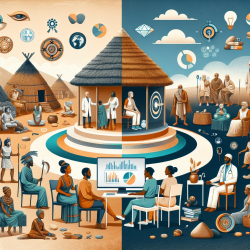Introduction
As a speech-language pathologist, understanding and addressing the multifaceted barriers that affect communication development is crucial. While the primary focus may be on speech and language, it's essential to recognize how broader health policies can impact child outcomes. The research article "Implementation and Effectiveness of Policies Adopted to Enable Breastfeeding in the Philippines Are Limited by Structural and Individual Barriers" offers valuable insights into how policy implementation can be improved to enhance child health outcomes, including those related to communication development.
Understanding the Barriers
The study highlights that despite the Philippines having a comprehensive breastfeeding policy framework aligned with global standards, its effectiveness is hampered by structural and individual barriers. Structural barriers include inconsistent breastfeeding promotion, limited access to skilled counseling, and insufficient workplace support. Individual barriers encompass knowledge gaps and misconceptions among mothers, as well as insufficient support from family members.
Implications for Speech-Language Pathology
For practitioners in speech-language pathology, these findings underscore the importance of considering environmental and systemic factors that may affect early childhood development. Breastfeeding is known to have a significant impact on the development of oral-motor skills, which are foundational for speech production. Thus, supporting breastfeeding through informed policy and practice can have downstream benefits for speech and language development.
Actionable Steps for Practitioners
- Advocate for Comprehensive Support: Encourage institutions to provide comprehensive support for breastfeeding mothers, which can include lactation consultants and breastfeeding-friendly workplace policies.
- Educate and Empower Parents: Provide parents with evidence-based information about the benefits of breastfeeding for speech and language development, addressing common misconceptions and barriers.
- Collaborate with Healthcare Providers: Work alongside pediatricians, lactation consultants, and other healthcare providers to ensure a holistic approach to child health and development.
- Promote Policy Change: Use your voice to advocate for policy changes that support breastfeeding, such as extended maternity leave and workplace accommodations.
Encouraging Further Research
The study also highlights the need for ongoing research to better understand the complex interplay between policy, individual behaviors, and child outcomes. Speech-language pathologists can contribute to this body of knowledge by conducting research that examines how breastfeeding and other health policies impact communication development.
Conclusion
By integrating the insights from this research into practice, speech-language pathologists can play a pivotal role in supporting breastfeeding and enhancing child development outcomes. For those interested in delving deeper into the research, the full article can be accessed through this link: Implementation and Effectiveness of Policies Adopted to Enable Breastfeeding in the Philippines Are Limited by Structural and Individual Barriers.










